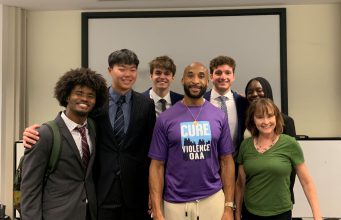Companies across the nation are asking key questions as the economy moves –albeit slowly — from recession into recovery.
Is it time to re-invest?
The same question was asked in various forms recently at the 2010 Executive Women of Goizueta Conference in Atlanta. On hand to speak were alumni, friends and faculty from the school and Vice Dean for Programs Rob Kazanjian. The afternoon panel discussion was sponsored by the Executive MBA program.
For some, the decision is to re-invest in education. For others, it’s jumping back into the job market as a hiring manager or worker. For even more, it’s about allocating money for additional investments or capital.
Panelists Trey Loughran (President, Equifax Personal Information Solutions), Kris Wooten (Senior VP, Finance at CNN Worldwide) and Melissa Babb (Managing Director, Harbert Management Corp.) talked about the economy and some key points to remember when guiding a company — or individual career — into an uncertain future.

“We all have an immediate appreciation for how difficult things are out there… We’re growing this year at just over 2 percent,” said Kazanjian, who moderated the panel. “[Goizueta economist]Jeff [Rosensweig’s] projection for next year is somewhere around 1-and-a-half percent.
“Companies’ balance sheets appear to be quite healthy. They are seemingly sitting on some resources and, yet, they face a good bit of uncertainty externally.”
Uncertainties include the possibility of higher taxes and new government regulations.
One strategy to survive the recession, according to Kazanjian, is an emphasis on core business, cost reduction and execution. Other groups try to grow in difficult environments — finding value investments.
Babb, whose private equity and venture capital firm consists of small and mid-size companies, said smaller companies first, in tough times, stop capital investments. Next steps — in order — are layoffs and/or right sizing and productivity advancements before getting back to hiring.
She said their focus has been a balance of Kazanjian’s observations: look inward, but expand with an eye toward value.
In fact, others on the panel talked about continued expansion, suggesting investment in growth doesn’t have to stop in a bad economy.
“We didn’t stop thinking about investing,” Wooten said of CNN. “(We asked) what are the opportunities the market place provides for us as a business and what are the things we’ve been doing for a period of time that aren’t providing for us?”
She said the focus has been working with affiliates to add value to the partnership and reduce costs. Another option is taking costs from one area and re-directing it to another area of growth.
Loughran said Equifax, which helps companies manage risks, has also taken a look at its internal practices. He said by becoming more efficient, the company is in better position to move when credit markets respond.
When it comes to growth vs. cost reduction, the key is looking at growth differently.
Loughran talked about a focus on measuring results. Wooten said media and technology groups can look at new trends like Google TV for new revenue. Babb said investments should be reviewed with more scrutiny, but it’s “a fantastic time to invest money” as a private equity firm.
Babb also discussed the concept of disruptive technology — new ideas that power young firms, which do most hiring — as a key to recovery.
When it comes to personal growth in a tough economy, particularly for job seekers, the trio of panelists offered encouraging words.
“You have to have a sense of what it is you bring to the table,” Babb said, adding an explanation of learned skills and talents — the hard-to-define assets you can provide to a company. “In this environment, it’s incredibly important to really look at your network; I’d be surprised if we aren’t all aware of numerous people that found new job opportunities and there wasn’t a job open; it was an upgrade or an opportunity created to take advantage of that persons talent.”











[…] This post was mentioned on Twitter by Small Business Hub, Goizueta Newsroom. Goizueta Newsroom said: Growth vs. Cost Reduction http://goo.gl/fb/BoZ4R #goizueta […]